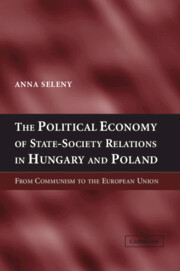 The Political Economy of State-Society Relations in Hungary and Poland
The Political Economy of State-Society Relations in Hungary and Poland Book contents
- Frontmatter
- Contents
- List of Tables
- List of Abbreviations
- Acknowledgments
- The Political Economy of State-Society Relations in Hungary and Poland
- Introduction: Points of Permeable Contact
- 1 History and Theory in Practice
- 2 Precocious Reformer: Hungary
- 3 Injustice: Poland 1948–1980
- 4 Poland: From Solidarity to 1989
- 5 Hungary: Property Relations Recast
- 6 Schumpeter by the Danube: From Second Economy to Private Sector
- 7 Action and Reaction: Institutional Consequences of Private-Sector Expansion
- Conclusion: Despotism, Discovery, and Surprise
- Index
7 - Action and Reaction: Institutional Consequences of Private-Sector Expansion
Published online by Cambridge University Press: 23 November 2009
- Frontmatter
- Contents
- List of Tables
- List of Abbreviations
- Acknowledgments
- The Political Economy of State-Society Relations in Hungary and Poland
- Introduction: Points of Permeable Contact
- 1 History and Theory in Practice
- 2 Precocious Reformer: Hungary
- 3 Injustice: Poland 1948–1980
- 4 Poland: From Solidarity to 1989
- 5 Hungary: Property Relations Recast
- 6 Schumpeter by the Danube: From Second Economy to Private Sector
- 7 Action and Reaction: Institutional Consequences of Private-Sector Expansion
- Conclusion: Despotism, Discovery, and Surprise
- Index
Summary
It is an important precondition of any organization to have greater coherence between its parts than between any of these parts and the environment of the organization.
László GaraiThe Hungarian entrepreneurs who burst onto the scene in 1982 partially remolded socialism's institutional logic to fit their business agendas. But they were by no means the only source of disruptive pressure bearing on the system's internal coherence. Within the structures of the state apparatus, too, conflicting interests and passions arose. In non-profit institutions such as hospitals, universities, and legal-services cooperatives, high-ranking administrators were outraged by the new laws, which motivated their professional staffs – surgeons and nurses, professors and researchers, lawyers and legal secretaries – to pursue independent careers. In the sectoral bureaus, ministers feared the loss of monopolistic power in their particular “spheres” of the economy. And in state firms, directors resented the new legal “freedoms” enjoyed by their private competitors.
Indeed, the reform itself (and the widespread reaction to it) so thoroughly compromised the institutional logic of the economy that the Ministry of Finance actually had to take on the role of “protector” of private enterprise, constantly trying to prevent resentful state-firm directors and hostile bureaucrats from “turning” on the new entrepreneurs. The Ministry's protective role – entailing complex politico-administrative lobbying – partially reflected the fact that it was the reform's institutional sponsor.
- Type
- Chapter
- Information
- The Political Economy of State-Society Relations in Hungary and PolandFrom Communism to the European Union, pp. 205 - 232Publisher: Cambridge University PressPrint publication year: 2006


